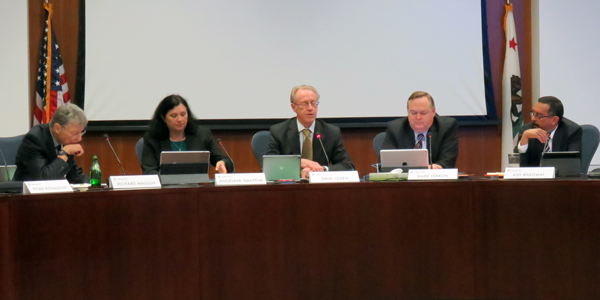By Jason Fordney
CAISO’s Board of Governors on Thursday approved controversial revisions to the ISO’s congestion revenue rights auction to address what some stakeholders contend are inequitable results and shortfalls for electricity consumers stemming from the CRR process.
The five-member board unanimously approved a second round of changes to the CRR auction, long a subject of controversy over what the ISO’s Department of Marking Monitoring has called out as consistently unfair outcomes to electricity ratepayers who have been require to foot about $100 million per year to make up for auction revenue shortfalls since the auctions began in 2012.
The new changes, known as “Track 1B,” focus on the revenue adequacy issue. The board in March had approved the “1A” package of changes focused on auction efficiency, which are now under review at FERC. (See CAISO Moves Ahead With Market Changes.) CAISO wants to implement both proposals in time for the 2019 CRR auction in fall of that year.
CAISO CEO Steve Berberich noted that the board had called a special meeting to approve the changes, saying it “clearly shows the importance to all of us.”
The 1B changes alter the current process in which all revenue inadequacy is allocated to measured demand, which includes electricity load and exports. That process does not consider the location of constraints on the system and creates an incentive to profit from differences between the CRR auction model and the day-ahead market model, according to Greg Cook, CAISO executive director of market and infrastructure policy, who presented the ISO’s findings to the board.
Under the new partial funding model, revenue inadequacy will be allocated to CRR holders in proportion to their flow over each constraint. Holders will receive day-ahead market payments aligned with available transmission capacity, which should result in a more equitable allocation on a locational basis.
A second component of the changes reduces the amount of system capacity released in the annual process from 75% to 65%. This will provide greater assurance that CRRs obtained in the annual process will be feasible in the monthly process and will reduce the amount of payment reductions resulting from revenue inadequacy charges, CAISO Vice President of Market and Infrastructure Development Keith Casey said in a memo to the board.
The DMM, the publicly owned Six Cities utilities of Southern California and the California Public Utilities Commission support the changes. Other parties said they go too far and that the impact of previous changes should be considered first.
The ISO will provide information on the outcome of the changes in its market reports to help ensure transparency, Cook said. The changes had received resistance from financial traders who argue the current structure allows for legitimate hedging activity. (See CAISO Developing New CRR Proposal.)
EIM Governing Body Picks New Member

At a separate meeting on Thursday, the leadership of CAISO’s Western Energy Imbalance Market confirmed a new member and made other changes as Chairman Douglas Howe prepares to leave the body at the end of this month.
The EIM’s Governing Body approved a nominating committee’s selection of Montana Public Service Commission Vice Chairman Travis Kavulla to replace Howe as a member effective July 1, for a three-year term. The body named current member Valerie Fong as chair, and re-nominated current member Carl Linvill as vice chair, both effective for one year. Linvill was also approved for a second three-year term.
Kavulla is the first new member named to the body since the original members were selected in June 2016 to oversee the regional energy trading market. The other two members of the body are John Prescott and Kristine Schmidt, whose terms end in 2019 and 2020, respectively.







